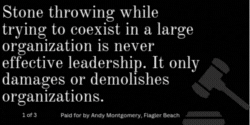
An Editorial Memo by the Sunshine Foundation
How well does your state legislature give its citizens access to its information? This Sunshine Week, as we reflect on the public’s right to know and the importance of open government, this should be a central question.
There are good reasons for this. Legislation springs up – seemingly out of nowhere. Think about the American Legislative Exchange Council’s secret lobbying in favor of “Stand Your Ground” legislation to at least 15 states. These lobbyists were backed by corporate special interests – a fact the public was left in the dark about. Additionally, there was little way to easily track how this law was passed in Florida and also around the country. That’s just one example of the kind of copycat legislation peddled to state legislatures.
With an increasingly gridlocked U.S. Congress, we can expect policy debates on a variety of important topics to be taken up in our state capitols. It’s critically important to be able to effectively monitor these public policy debates and those who seek to influence them. And in a democracy, citizens have the right to know how their elected officials at all levels consider legislation so they can be held accountable.
And in the Internet age, that means having reliable access to this information online. Principles have to be established for effective disclosure. General consensus among the open government community that can be used as a guidepost defines that data should be: complete, primary, timely, accessible, machine processable, non-discriminatory, non-propriety, license-free and permanent.
A new “transparency report card” from the Sunlight Foundation assesses how well state legislative information is made available to the public. Most state legislatures are generally behind the technological curve, and that has negative implications for government oversight. Sunlight’s review is based on several of these open data principles, and we provide this report card to help state legislatures improve how they present their data and information online. To their credit, many states have embraced the web for decades and do disclose legislative data, but their technological progress has stalled. At the same time, a cottage industry of expensive pay-services has sprouted to make state legislative data more useful to those who can afford it.
A mere seven states earned an ‘A’ grade, and several failed. To be sure, our experience working with many in government shows there is an appetite to modernize disclosure practices, and fortunately, cash-strapped state legislatures do not have to employ expensive services to follow these open data principles.
Evaluated across six criteria, Sunlight developed a scorecard and letter grades for all 50 states and the District of Columbia. Factors include: completeness, timeliness, ease of electronic access, machine readability, use of commonly owned standards and permanence. Four of the aforementioned open data principles (primacy, non-discrimination, licensing, and usage costs) were omitted — not due to lack of serious concerns about these criteria when reviewing state government data, but because there wasn’t enough of a difference between states on these points for us to make a worthwhile comparative judgment.
This work was based on Sunlight’s experience in creating OpenStates.org, a website (and accompanying iPhone/iPad app) with open source, comprehensive data feeds of legislative information for all 50 states, plus the District of Columbia and Puerto Rico. Open States simplifies the ability to research state lawmakers, review their votes, search legislation and track bill progress, as well as compare legislation from state to state.
In this spirit, Sunlight offers these recommendations. We know first-hand from our ongoing dialogue with state legislatures and open government technologists that identifying these commonplace problems can go a long way toward addressing them. And there is interest from within and outside government to improve data disclosure. The benefits of state legislatures wisely using technology and the latest open data standards go well beyond improving journalistic, academic or advocacy-related research — they create vehicles for accountability.
As we celebrate the spirit of James Madison this Sunshine Week, let’s encourage our state legislatures to embrace the prevailing ways of strengthening American democracy that current technology affords.
![]()
The Sunlight Foundation is a non-partisan non-profit that uses cutting-edge technology and ideas to make government transparent and accountable. Visit http://SunlightFoundation.com to learn more about Sunlight’s projects, including http://PoliticalPartyTime.org and http://InfluenceExplorer.com.





























Leave a Reply